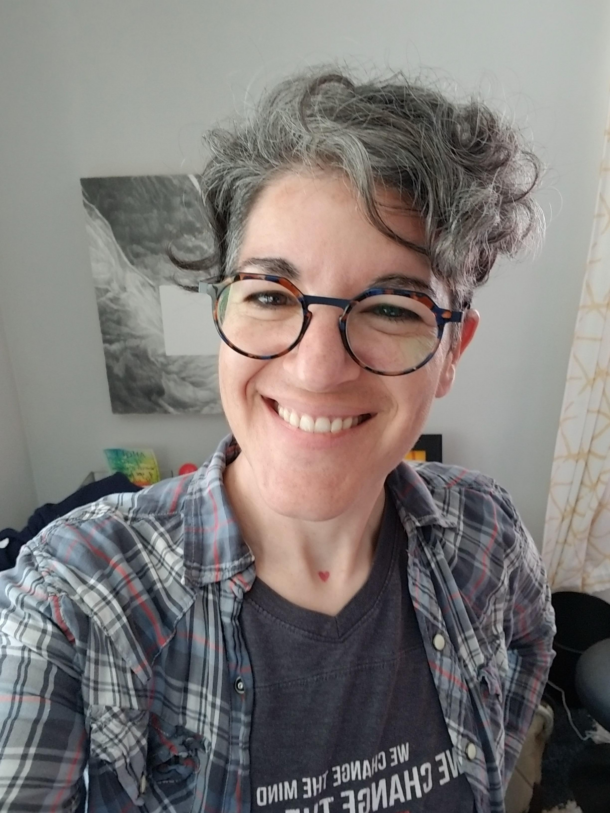The Longest 30 Seconds of My Life: My TEDx Talk
In March 2013, I stepped off the stage after giving a TEDx Talk. My legs were shaking from adrenaline. I wanted to melt into the wall rather than turn the corner and walk into a crowd that was now milling about during an intermission.
Why? Because smack in the middle of my 10 minute talk about authenticity in business, I blanked. Hard. I stood there for an eternity of seconds without any safety net or cue cards while the audience held its collective breath and I wondered how I was going to survive.
At the time, I was 35 years old and my foundational belief was that life was basically a pointless slog and the best a person could do was find a nice partner and maybe a friend or two in the hopes of enjoying the slog until it was finally, mercifully over. Sounds a little dramatic as I write it and yet I not only believed this, I lived it for quite some time.
In fact, I had built my life around avoiding the pain inherent in life. I did things like:
- Shrink my dreams to avoid the disappointment of falling short
- Bail on social events to avoid the potential for awkward interactions
- Fail to nurture family and friend relationships for fear of disrupting anything about the routines of serenity my then-husband and I had constructed to protect our shared slog
- Make excuses for not following through on goals, growth-related activities or professional development
- Watch enormous amounts of television to fill my time without risk of overstepping the implicit boundaries I had built into my life
The hours after my TEDx Talk are a blur to me now but I can tell you that sometime in that whirl of self-punishment came profound self-awareness. I somehow recognized that my fear was a function of perfectionism – if I couldn’t do life perfectly, I didn’t want to try at all. I recognized a piece of myself that didn’t want to hide anymore.
By the end of the night, I had ordered two books: A series of essays on meditation called The Art of Just Sitting and Brené Brown’s classic, The Gifts of Imperfection. I braced myself for the work I was getting ready to do.
The external changes that came from the internal work happened so much more quickly than I could have guessed.
Within five months, I had enrolled in a coach training program and was working both with my first mentor coach and my first clients.
Within two years, I had changed almost every corner of my life. I was filled with a sense of joy that was completely novel to me and felt as though a geyser had been uncorked in my guts. For real.
Now, I have no sense of slog. Instead, life feels like an endless series of moments wonder, play, and big heart-filling gratitude.
Now, I have no sense of hiding from life. Instead, I feel anxiety, fear and discomfort like a spy movie protagonist who heard a squeaky floorboard in the other room, bringing a “Well, I guess I better go check that out” attitude, knowing I can handle whatever I might find.
Sure, I come away bruised from time to time – I’ve had some emotional cracked ribs – but I’m all the wiser, all the stronger, all the more courageous for the dust up.
Maybe you’re ready to transform an experience that feels like an anvil in your tummy into the barbell you dead lift like an Olympian. I can show you how.
Should we talk?
Talk is cheap, and this time it’s free! We know a lot of people offer free consultations that are just long, painful sales presentations. That’s not what this is. Let’s just talk and test the fit, no strings attached.
Here’s the latest from the blog.
Meditation: A Practice in Being with Mundane Awe
Meditation can feel like a thing monks in far-off lands do (or people in San Francisco) yet it can be an easily-accessible practice for anyone who wants to navigate their discomfort a little more skillfully and be in life a little more fully. Bonus: It’s a great tool for navigating holiday stress!
A Rocky Part of Normal
I made you something, a free downloadable zine so that you have your own wise guidance on those days that are a rocky part of normal.
An Always-Available Choice
Sojourner Truth said, “Life is a hard battle anyway. If we laugh and sing a little as we fight the good fight of freedom, it makes it all go easier.” Let’s look at what it means to follow her guidance.
